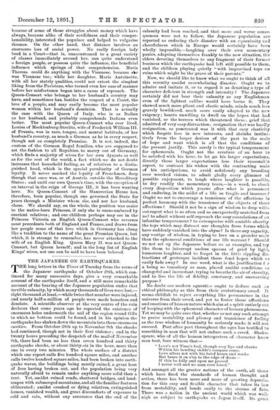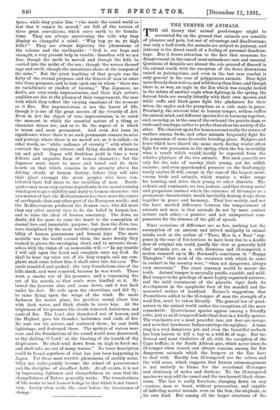THE JAPANESE ON EARTHQUAKES.
THE long letters in the Times of Tuesday from the scene of the Japanese earthquake of October 28th, which con- tinued for many successive days, give a very remarkable account of the earthquake itself, and a still more remarkable account of the bearing of the Japanese population under that terrible calamity, by which many thousands of lives were lost,— eight thousand at least,—while twice that number were injured, and nearly half-a-million of people were made homeless and desolate. A scientific observer at the very centre of the ruin declares that some years ago he reported the existence of enormous holes underneath the soil of the region round Gifu to which no bottom could be found, and in his opinion the earthquake has shaken down the mountain into these enormous cavities. From October 28th up to November 9th the shocks had continued, though not in their first violence ; and in the twenty hours preceding the despatch of the mail of November 9th, there had been no less than seven hundred and thirty earthquake shocks, or about thirty-six in the hour, more than one in every two minutes. The whole surface of a district which one report calls five hundred square miles, and another calls twelve hundred square miles, had been broken into earth- quake waves, the buildings being mostly ruined, a great host of fires having broken out, and the population being very naturally afraid to remain under anything more solid than a tent. Yet, amidst ruined roads, shattered bridges, and land- scapes with submerged mountains, and all the familiar features obliterated ; amidst crushed or dying relatives, extinguished homes, vanished wealth, and great discomforts of exposure to cold and rain, without any assurance that the end of the
calamity had been reached, and that more and worse conse- quences were not to follow, the Japanese population are reported as enduring their disaster with an equanimity and cheerfulness which in Europe would certainly have been wholly impossible,—laughing over their own momentary panics, adapting themselves frankly to the new situation, the elders devoting themselves to any fragment of their former business which the earthquake had left still possible to them, and the children playing quietly "with improvised toys on ruins which might be the grave of their parents."
Now, we should like to know what we ought to think of all this serenity amidst overwhelming disaster. Ought we to admire and imitate it, or to regard it as denoting a type of character deficient in strength and intensity ? The Japanese certainly did not bear their calamity as any Englishman even of the lightest calibre would have borne it. They showed much more pliant and elastic minds, minds much less gravely bewildered, much more easily adapted to the new exigency; hearts unwilling to dwell on the hopes that had vanished, or the terrors which threatened them ; grief that admitted of very easy distraction ; resignation that was hardly resignation, so penetrated was it with that easy elasticity which forgets loss in new interests, and shrinks instinc- tively from the larger desires of the past to the scale of hope and want which is all that the conditions of the present justify. This surely is the typical temperament for ephemerals. Ought not the creature of an hour to be satisfied with his hour, to let go his larger expectations, directly those larger expectations lose their reasonab:e aspect, to contract his wishes with the contracting scale of his anticipations, to avoid sedulously any brooding over wrecked visions, to admit gladly every glimmer of possible enjoyment, to laugh where laughter is possible, to dry readily the momentary tears,—in a word, to check every disposition which yearns after what is permanent and enduring, in the midst of a life so fragile and insecure P Ought we not to encourage a transience of the affections in perfect harmony with the transience of the objects of those affections ? Should it not be a sign of wisdom to drop with- out regret what is so often and so unexpectedly snatched from us? to admit without self-reproach the easy consolations of an infantine temperament ? to extemporise with amiable alacrity the toys which may distract our thoughts from forms which have suddenly vanished into the abyss P Is there any sagacity, any vestige of wisdom, in trying to love on a grander scale than the ephemeral conditions of our life warrant ? Should we not set up the Japanese before us as examples, and try like them to interrupt useless spasms of grief by light, humorous laughter, and to forget in the little rippling dis- tractions of grotesque incident those fond hopes which so easily fade away ? In one word, what is the justification f, r a being so transitory as man, placed amidst conditions so changeful and inconstant, trying to breathe the air of eternity, and to live the life of fidelity, constancy, and unswerving purpose?
No doubt our modern agnostics ought to deduce such an ethical philosophy as this from their evolutionary creed. It seems childish to reject everything like permanence in the universe from their creed, and yet to foster those affections and emotions of human nature which aim at a spirit entirely out of keeping with the ephemeral character of human phenomena. Yet we may be quite sure that, whether or not any such attempt to praise mutability and pliancy and transience of feeling as the true wisdom of humanity be seriously made, it will not succeed. Poet after poet throughout the ages has testified to something in man that will not endure such a creed. Shake- speare, who of all the human interpreters of character knew man best, bore witness that-
" Love's not Time's fool, though rosy lips and cheeks Within his bending sickle's compass come, Love alters not with his brief hours and weeks But bears it on e'en to the edge of doom— If this be folly and upon me proved
I never writ and no man ever loved."
And amongst all the greater nations of the earth, all those which have fixed the standards of human thought and action, there has been more and more of growing deprecia- tion for this easy and flexible character that takes its law from mutability, and bends easily to the storms of fate.
There was a nation in the ancient world which was well- nigh as subject to earthquake as Japan itself. Its great lyrics, while they praise him "who made the round world so fast that it cannot be moved," are full of the terrors of these great convulsions, which move earth to its founda- tions. They are always questioning the hills why they display so changeful a mind : "Why hop ye so, ye high hills?" They are always depicting the phenomena of the volcano and the earthquake : "God is our hope and strength, a very present help in trouble : therefore will we not fear, though the earth be moved, and though the hills be carried into the midst of the sea ; though the waters thereof rage and swell; though the mountains shake at the tempest of the same." But the great teaching of that people was the fixity of the eternal purposes, and the fitness of man to enter into those purposes, and to lean upon one in whom "there was no variableness or shadow of turning." The Japanese, no doubt, are very ready impressionists, and their high artistic qualities are due to the pliancy of their temperament, the ease with which they reflect the varying emotions of the moment as it flies. But impressionism is not the lesson of life, though it is one of the great secrets of the vivacity of Art. Even in Art the object of true impressionism is to catch the moment in which the essential nature of a thing or character shines out, and so to fix the aspect of it which is truest and most permanent. And even Art loses its significance where there is no such permanent essence to seize and portray, where there is no sacred art, as it is called,—in other words, no "white radiance of eternity" with which to contrast the varying colours and flying shadows of human joy and grief. Japan will doubtless yield in time a very delicate and exquisite form of human character ; but the Japanese must learn to muse and brood and fix their hearts on that which remains in its serenity above the driving clouds of human destiny, before they will take their place amongst the great peoples who have con- tributed their full share to the moulding of man. Earth- quakes may seem very curious ingredients in the moral training which goes to give stability and fixity to human character; but as a matter of fact, the Mediterranean has been more the centre of earthquake than any other part of the European world ; and the Mediterranean produced the Roman race, who did more than any other ancient race to fix the belief in human law, and to raise the ideal of human constancy. The Jews, no doubt, did far more to raise the heart to the conception of eternal love and immutable purpose ; but then the Jews, too, were disciplined by the most terrible experience of the muta- bility of human possessions and human joys. The more mutable was the world around them, the more keenly they seemed to pierce the enveloping cloud, and to saturate them- selves with the vision of an immutable will :—" In my trouble I will call upon the Lord, and complain unto my God. So shall he hear my voice out of his holy temple, and my com- plaint shall come before him, it shall enter into his ears. The earth trembled and quaked ; the very foundations also of the hills shook, and were removed, because he was wroth. There went a smoke out of his presence, and a consuming fire out of his mouth, so that coals were kindled at it. He bowed the heavens also, and came down, and it was dark under his feet. He rode upon the cherubims, and did fly ; he came flying upon the wings of the wind. He made darkness his secret place, his pavilion round about him with dark water, and thick clouds to cover him. At the brightness of his presence his clouds removed, hailstones, and coals of fire. The Lord also thundered out of heaven, and the Highest gave his thunder, hailstones and coals of fire. He sent out his arrows, and scattered them ; he cast forth lightnings, and destroyed them. The springs of waters were seen, and the foundations of the round world were discovered, at thy chiding, 0 Lord ! at the blasting of the breath of thy displeasure. He shall send down from on high to fetch me, and shall take me out of many waters." No truer description could be found anywhere of what has just been happening in Japan. Yet these most terrible phenomena of earthly muta- bility not unfrequently become the school of perseverance and the discipline of steadfast faith. At all events, it is not by impressing lightness and changefulness on man that the changefulness of Nature generally works. The transitoriness of life seems to lead human beings to that which is not transi- tory. Levity often melts like snow before the hurricanes of change.











































 Previous page
Previous page